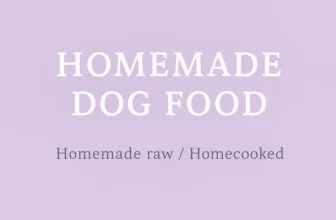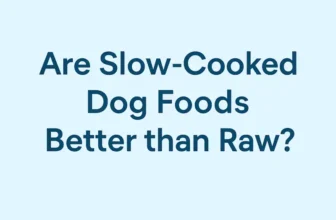Is rice good for dogs?

Isn’t it odd how rice is in so many cat foods, yet cats are obligate carnivores who don’t need starchy carbohydrates in their diet?
It begs the question – why is rice in so many dog foods, and is it even good for dogs?
Given so many veterinarians recommend “chicken and rice” when your dog has been sick, it’s easy to assume rice is good for dogs.
But the thing is, rice is a high GI grain that can cause spikes in blood sugar, and given grains are harder to digest they are in essence inflammatory. Besides, our dogs are borderline carnivore, aren’t they?
Rice might be a cheap way to feed our ravenous dogs, but is it good for them?
Let’s discuss the pros and cons:
Your dog doesn’t need rice!
As a nutritionist of animals I view more as carnivores rather than omnivores, I would say your dog does not need rice in their diet.
The nutritional needs of our dogs comes from animal sources. Not plants, and not grains.
There are many very healthy raw fed dogs in the world who haven’t touched a grain of any kind, but I can’t ignore rice as one of the more digestible and cost-effective grains.
Rice as a bland food won’t tend to cause any gastrointestinal upset, which is why vets commonly recommend it when your dog’s had a bout of vomiting or diarrhea.
As a staple food rice is readily available, and you likely have a bag in your cupboard. Rice is also better than other grains used in dog foods, and also – clincher – very cheap (which brings me on to my next topic).
Why is rice really in dog food?
Whether we like it or not, grains are a necessary evil in most dog foods.
If not grains, then alternatives like potatoes or tapioca which you shouldn’t consider any better for your dog.
As consumers we’re often constrained by budget, so true meat-based dog foods like ZIWI Peak or Frontier Pets aren’t a viable option even if they’re healthier for our dogs.
I have an active medium sized dog (Border Collie), and even I struggle with the cost of feeding her. I couldn’t afford a large breed. With prices ramping up in recent years I’m even feeling the cost of feeding my cat, and dread to think the cost over a year.
Grains make dog foods affordable, even if they’re not as optimal as meat-based dog foods, BARF, or raw.
We need to find a balance between affordability and quality, and that’s the reason grains like rice are in so many dog foods. If they weren’t, most of us wouldn’t be able to afford dog food.
Pet food companies make products for target demographics, not necessarily to benefit our pets. Keep that in mind.
A meat-based dog food may cost more than double a decent grain-based dog food, and significantly more than a supermarket brand of dog food.
Why is rice better than wheat and cereal grains?
Despite being a grain, rice is a better option to “wheat” or “cereal grains and by-products” which are found in many dog foods on the cheaper end of the scale.
I see wheat and ambiguous cereals (often wheat) as problematic ingredients which may leave your dog itchy, overweight, stiff, or sick in later years.
Quick tip: Avoid wheat and “cereals” at the very least.
What grains are better for your dog than rice?
Keeping in mind no grains are optimal for a dog, and definitely not for a cat, a better alternative to rice is oats which has a low glycemic index, and arguably corn (yes, corn is scientifically a grain).
Brown rice is often considered the healthier option to white rice, but as a grain is still harder for your dog to digest. Brown rice has more fibre than white rice, and although is arguably the healthier option there is evidence your dog will struggle to digest brown rice more than white rice.
Is corn a better alternative to rice?
Corn is a common alternative to rice in brands such as Royal Canin (and other Mars brands). It’s often criticised in pet food (which I suspect is why Mars brands opt for the term “maize” rather than “corn”), but there are distinct advantages over rice.
Corn provides more essential fatty acids, a lower glycemic index, and a better amino acid profile. It’s easier to digest than brown rice and offers more fibre than white rice, and most importantly has higher protein – protein is always the better option to carbohydrates in a canine diet.
However, be wary of Corn Gluten Meal (CGM) which is a poorer quality ingredient used mostly to ramp up protein in a dog food.
Is rice easy for dogs to digest?
Yes, rice is one of the easier grains for dogs to digest.
Rice in dog food is often processed to remove the bran, making it more digestible.
However, both dogs and cats can struggle to digest grains in general. Their biological structure and digestive system is geared towards digesting animal matter from prey, not grains or plant matter.
Compared to animal ingredients, rice is harder for your dog to digest, with questionable nutrient value.
Better alternatives to “chicken and rice” for sick dogs
There are a number of reasons your veterinarian may recommend a “chicken and rice” diet to help your dog recover from a bout of illness.
Chicken and rice are easy to source. Chicken is lean, and for most dogs does not pose a problem with intolerance (you will likely know already if your dog has a sensitivity to chicken).
As a bland diet, chicken and rice is a safe option for your dog even when we consider rice is a high GI grain, and in any case should always be a temporary diet of one or two weeks – chicken and rice does not cater for all the nutrients your dog needs (which in pet food terms is referred to as “complete and balanced”).
If you’re looking for a better alternative to “chicken and rice”, here are some quick suggestions:
- Chicken and Pumpkin – Pumpkin is gentle on digestion and provides fibre.
- Turkey and Sweet Potato – Lower GI than rice, rich in nutrients, and a better option if your dog has a chicken intollerance.
- Bone Broth and Shredded Meat – Hydrating, absolutely rammed with nutrients, and easy to digest.
- White Fish and Mashed Carrots – Light, lean protein with gut-friendly fibre. Beware of cooked bones.
- Egg and Oatmeal – Oats are lower GI, cheap (make sure you buy 100% oats), and easier on the stomach.
If you have any other suggestions, feel free to say so in the comment section below!
What do you think – is rice good for dogs?

Join the Reddit community r/HealthyAussiePets






